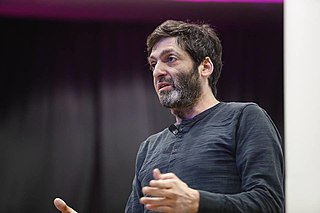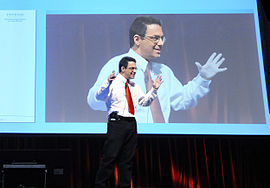In marketing, publicity is the public visibility or awareness for any product, service, person or organization. It may also refer to the movement of information from its source to the general public, often via the media. The subjects of publicity include people of public recognition, goods and services, organizations, and works of art or entertainment.
The peak–end rule is a psychological heuristic in which people judge an experience largely based on how they felt at its peak and at its end, rather than based on the total sum or average of every moment of the experience. The effect occurs regardless of whether the experience is pleasant or unpleasant. To the heuristic, other information aside from that of the peak and end of the experience is not lost, but it is not used. This includes net pleasantness or unpleasantness and how long the experience lasted. The peak–end rule is thereby a specific form of the more general extension neglect and duration neglect.
In psychology and behavioral economics, the endowment effect, also known as divestiture aversion, is the finding that people are more likely to retain an object they own than acquire that same object when they do not own it. The endowment theory can be defined as "an application of prospect theory positing that loss aversion associated with ownership explains observed exchange asymmetries."
As part of consumer behavior, the buying decision process is the decision-making process used by consumers regarding the market transactions before, during, and after the purchase of a good or service. It can be seen as a particular form of a cost–benefit analysis in the presence of multiple alternatives.

Mental accounting is a model of consumer behaviour developed by Richard Thaler that attempts to describe the process whereby people code, categorize and evaluate economic outcomes. Mental accounting incorporates the economic concepts of prospect theory and transactional utility theory to evaluate how people create distinctions between their financial resources in the form of mental accounts, which in turn impacts the buyer decision process and reaction to economic outcomes. People are presumed to make mental accounts as a self control strategy to manage and keep track of their spending and resources. People budget money into mental accounts for savings or expense categories. People also are assumed to make mental accounts to facilitate savings for larger purposes. Mental accounting can result in people demonstrating greater loss aversion for certain mental accounts, resulting in cognitive bias that incentivizes systematic departures from consumer rationality. Through increased understanding of mental accounting differences in decision making based on different resources, and different reactions based on similar outcomes can be greater understood.

Dan Ariely is an Israeli-American professor and author. He serves as a James B. Duke Professor of psychology and behavioral economics at Duke University. Ariely is the co-founder of several companies implementing insights from behavioral science. Ariely wrote an advice column called Ask Ariely in the WSJ from June 2012 until September 2022. Ariely is the author of the three New York Times best selling books Predictably Irrational, The Upside of Irrationality and The Honest Truth about Dishonesty. He co-produced the 2015 documentary (Dis)Honesty: The Truth About Lies.
Search costs are a facet of transaction costs or switching costs and include all the costs associated with the searching activity conducted by a prospective seller and buyer in a market. Rational consumers will continue to search for a better product or service until the marginal cost of searching exceeds the marginal benefit. Search theory is a branch of microeconomics that studies decisions of this type.
Choice architecture is the design of different ways in which choices can be presented to decision makers, and the impact of that presentation on decision-making. For example, each of the following:
Itamar Simonson is a professor of marketing, holding the Sebastian S. Kresge Chair of Marketing in the Graduate School of Business, Stanford University. He is known for his work on the factors that determine the choices that buyers make. His academic career started at the University of California at Berkeley, where he taught for six years, before he moved to Stanford. Many of his former PhD students hold senior positions at some of the best universities in the world.
Marketing science is a field that approaches marketing – the understanding of customer needs, and the development of approaches by which they might be fulfilled – predominantly through scientific methods, rather than through tools and techniques common with research in the arts or in humanities.
Catherine Tucker is the Sloan Distinguished Professor of Management at MIT Sloan, where she is also chair of the PhD program. She is known for her research into the consequences of digital data for electronic privacy, algorithmic bias, digital health, social media and online advertising. She is also a research associate at the NBER, cofounder of the Cryptoeconomics lab at MIT with Christian Catalini and coeditor at Quantitative Marketing Economics.
Maqbool Dada is a professor at Carey Business School, Johns Hopkins University, with expertise in the areas of operations management, healthcare, and marketing. He is also a core faculty member at the Johns Hopkins School of Medicine’s Armstrong Institute for Patient Safety and Quality.
Baba Shiv grew up in India and is an American marketing professor and an expert in the area of neuroeconomics. He is the Sanwa Bank, Limited, Professor of Marketing at Stanford Graduate School of Business, Stanford University. His work has been featured in The Tonight Show with Jay Leno, CNN, Fox Business, Financial Times, The New York Times and The Wall Street Journal. Shiv received his PhD from Duke University.
The economics of digitization is the field of economics that studies how digitization, digitalisation and digital transformation affects markets and how digital data can be used to study economics. Digitization is the process by which technology lowers the costs of storing, sharing, and analyzing data. This has changed how consumers behave, how industrial activity is organized, and how governments operate. The economics of digitization exists as a distinct field of economics for two reasons. First, new economic models are needed because many traditional assumptions about information no longer hold in a digitized world. Second, the new types of data generated by digitization require new methods for their analysis.

A user review is a review conducted by any person who has access to the internet and publishes their experience to a review site or social media platform following product testing or the evaluation of a service. User reviews are commonly provided by consumers who volunteer to write the review, rather than professionals who are paid to evaluate the product or service. User reviews might be compared to professional nonprofit reviews from a consumer organization, or to promotional reviews from an advertiser or company marketing a product. Growth of social media platforms has enabled the facilitation of interaction between consumers after a review has been placed on online communities such as blogs, internet forums or other popular platforms.

Joannes Evangelista Benedictus Maria "Jan-Benedict" Steenkamp is a marketing professor and author. He is the Knox Massey Distinguished Professor of Marketing at Kenan-Flagler Business School, University of North Carolina at Chapel Hill. He is also the co-founder and executive director of AiMark, a global center studying key marketing strategy issues. Steenkamp is the author of Time to Lead, Retail Disruptors, Global Brand Strategy, Brand Breakout and Private Label Strategy. He is one of the most cited scholars in business and marketing.

Oded Lowengart is Professor of Marketing at the Ben-Gurion University of the Negev (BGU) in Israel, where he holds the Ernest Scheller Jr. Chair in Innovative Management and is Head of the Department of Business Administration. His two terms as Dean of the Guilford Glazer Faculty of Business and Management (2013–18) saw to opening the International MBA Program, expanded global programs, and increased Journal Citation Reports-ranked research publications.
Boris Maciejovsky is an Austrian behavioral scientist, and an Associate Professor of Management at the School of Business at the University of California, Riverside. He is also the founder and managing partner at Greenleaf Analytics LLC, a behavioral management consultancy. His research focuses on behavioral economics and organizational decision-making.

Tinglong Dai is a Professor of Operations Management and Business Analytics at the Carey Business School, Johns Hopkins University, with expertise in the areas of healthcare analytics, global supply chains, the interfaces between marketing and operations, and human–AI interaction. Dai's research primarily examines the health care ecosystem using analytics approaches, with a focus on behavioral, incentive, and policy issues related to healthcare operations management.
Eyal Biyalogorsky is an Professor of Marketing and Deputy Dean at the Arison School of Business at the Reichman University. Biyalogorsky's research focusses on pricing, product management, product Marketing strategy and consumer referral management.






